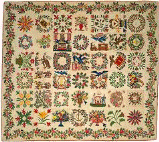Textile Society of America

Textile Society of America: Symposium Proceedings
Date of this Version
1988
Document Type
Article
Citation
From Textiles as Primary Sources: Proceedings of the First Symposium of the Textile Society of America, Minneapolis Institute of Art, September 16-18, 1988
Abstract
ABSTRACT
The Cornett farm was settled in 1844 when northwestern Missouri was still frontier. The farm, its buildings and contents were donated to the University of Missouri in 1981. The house, built in 1884, contained three generations' of belongings. Among them were 41 quilts made by various members of Cornett family between 1855 and 1940.
This collection gives researchers valuable insights into the way people lived and how resources were utilized. Among the oldest quilts is one made entirely from handwoven homespun which was also home dyed. The fabrics were previously articles of clothing. A transitional quilt utilizes homespun fabrics which are hand-stitched on the face, while the backing is machine stitched of various homespun and commercial suitings of the 1870- 90 period. Another group of quilts dating from the 1930s utilizes pastel and floral printed cottons in patterns like "Grandmother's Flower Garden" and "Wedding Ring" which were published in the Kansas City Star and other newspapers read by rural Missourians.
The makers of this collection of quilts are firmly documented. The oldest utility quilt was made by a mother of five from materials at hand. The requirements of self-sufficient agricultural venture left meager cash resources to be squandered on bedding that could be acquired in other ways. The makers of the "Grandmother!s Flower Garden" or the "Wedding Ring" quilts, on the other hand, were well-educated women with readily available cash supplies who could indulge in making attractive quilts in the latest style for recreation. Such products were used more for decoration than for warmth.


Comments
Copyright © 1988 by the author(s).